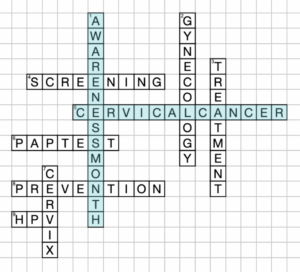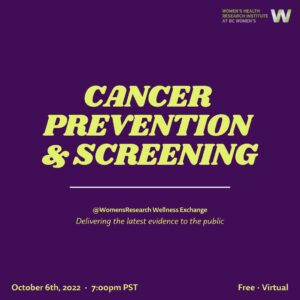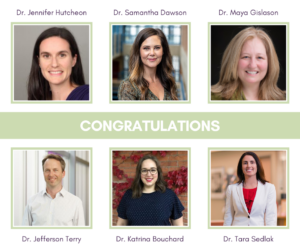
Call for posters: Eighth Annual Women’s Health Research Symposium
The Women’s Health Research Institute (WHRI) is now accepting submissions for the poster session that will take place at the Eighth Annual Women’s Health Research

The Women’s Health Research Institute (WHRI) is now accepting submissions for the poster session that will take place at the Eighth Annual Women’s Health Research

January is Cervical Cancer Awareness Month In the year 2022, more than 1400 Canadians were diagnosed with cervical cancer and an estimated 380 died from

On October 6, 2022, the WHRI hosted a bi-annual public event, the @WomensResearch Wellness Exchange. The topic, Cancer Prevention and Screening, showcased members addressing topics regarding

The Women’s Health Research Institute (WHRI) is very pleased to congratulate the recipients of the 2022 Women’s Health Research Institute Catalyst Grants. This competition was

“Exploring arts-based knowledge translation with the HIV Made Me Fabulous team” features guests Dr. Angela Kaida (Film Co-Producer), Juno Roche (Film Writer and Narrator), and

Looking for different ways to engage during Digital Health Week? Join us in celebrating Digital Health Week by attending events, listening to podcast episodes, sharing
The Women’s Health Research Institute would like to acknowledge that we are uninvited guests on the unceded ancestral territories of the xʷməθkwəy̓əm (Musqueam), Skwxwú7mesh (Squamish), Stó:lo, and sel̓íl̓witulh (Tsleil-waututh) Nations.
As a provincial research institute committed to improving the health outcomes of women, including those across the 2SLGBTQIA+ spectrum, we recognize our responsibility in the collective effort towards establishing culturally safe health care systems and services that address health inequities among Indigenous peoples, especially Indigenous women, girls, and Two-spirit peoples.
We encourage all people involved in research to read both the Truth and Reconciliation Commission of Canada: Calls to Action and the In Plain Sight Report, and reflect on ways we can incorporate the recommendations into our work. As we gather in spaces together, we encourage you to reflect on your positionality on these lands and your personal commitments to reconciliation.